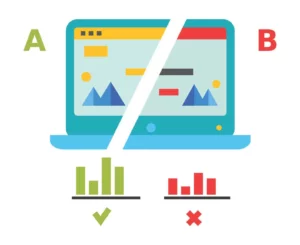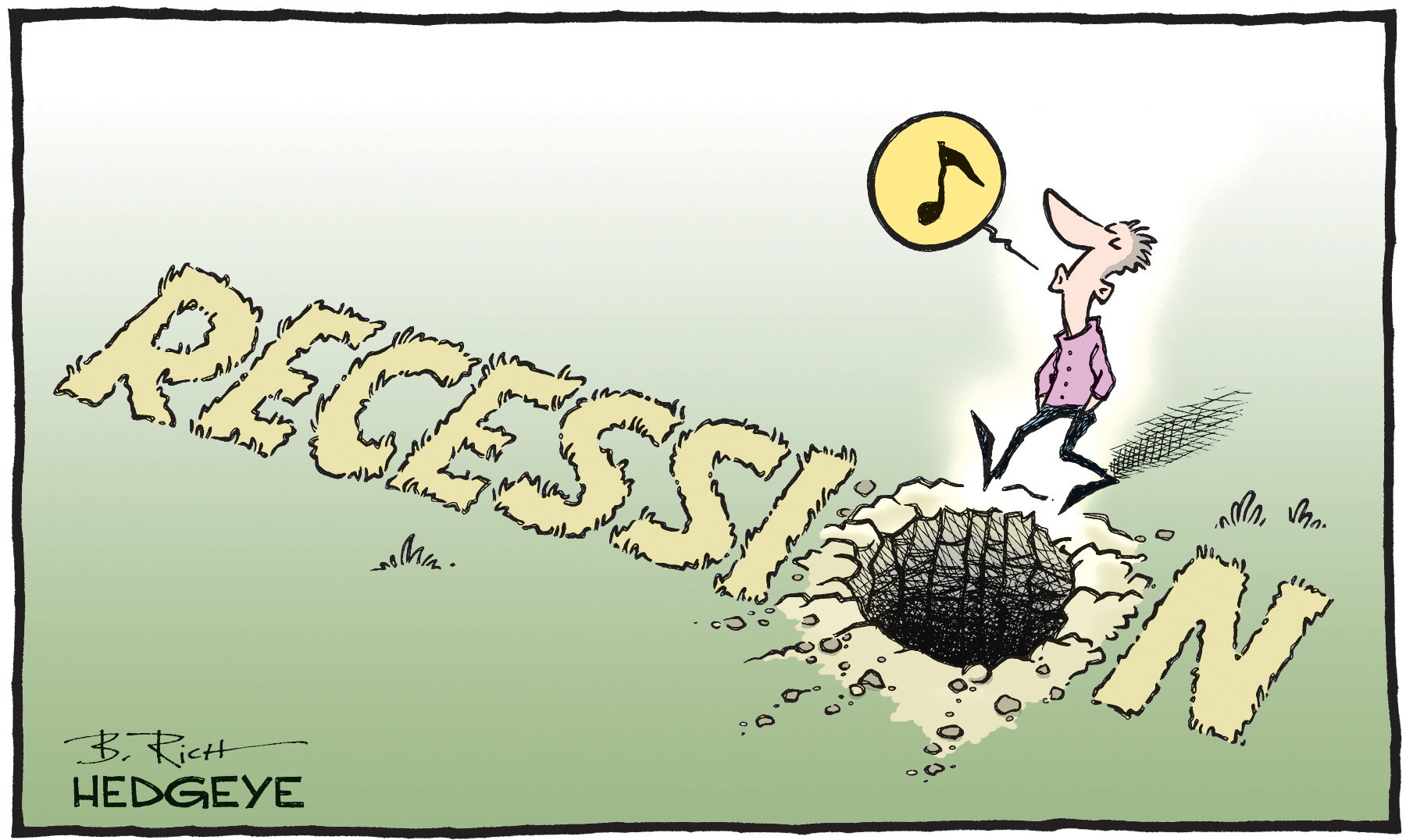What is an economic recession or economic slowdown?
A recession is a period of economic decline, typically defined as two consecutive quarters of negative GDP growth. The risk of a recession in 2024 depends on many factors, such as inflation, interest rates, fiscal and monetary policies, trade tensions, consumer confidence, and global events. Different sources may have different predictions based on their assumptions and models. In such times, it becomes crucial for affiliate marketing businesses to adapt their strategies to maintain resilience and continue generating profits.
2024: Are we in a recession?
 While the future is uncertain, economists have been speculating about the possibility of a recession in 2024. Although it is impossible to predict with absolute certainty, understanding the potential for a recession and its implications for your affiliate marketing business can help you prepare and implement effective strategies to navigate through challenging times. The consensus for a recession in 2024 is mixed. While some experts predict the possibility of a recession, others believe it may be avoided or that a soft landing is more likely. Here are some key points from various sources:
While the future is uncertain, economists have been speculating about the possibility of a recession in 2024. Although it is impossible to predict with absolute certainty, understanding the potential for a recession and its implications for your affiliate marketing business can help you prepare and implement effective strategies to navigate through challenging times. The consensus for a recession in 2024 is mixed. While some experts predict the possibility of a recession, others believe it may be avoided or that a soft landing is more likely. Here are some key points from various sources:
- The National Association for Business Economics (NABE) conducted a survey in December 2023, where more than three-fourths of economists (76%) believed that the chances of a recession in the next 12 months were 50% or less.
- Bank of America is predicting a soft landing rather than a recession, despite downside risks. Larry Adam, the chief investment officer at Raymond James, also mentioned that their base case is a mild recession, which may be “the mildest in history” and may begin in the second quarter of 2024.
- A report from Statista Research Department published in January 2024 indicated that the projected probability of the United States falling into another economic recession by December 2024 was 62.94%, which was an increase from the preceding month’s projection of 51.84%.
Overall, while there are concerns and projections indicating the possibility of a recession, there is also a significant portion of experts who believe that a recession may be avoided or that it may be mild if it does occur. This mixed consensus suggests a level of uncertainty regarding the economic outlook for 2024.
Introduction: Understanding the impact of a recession on affiliate marketing businesses
Affiliate marketing is a business model that thrives on consumer spending. During a recession, consumers tend to tighten their belts, resulting in decreased purchasing power. This can have a direct impact on affiliate marketers, as their commissions are often earned through sales generated by their promotional efforts. However, it is important to note that not all affiliate marketing niches are equally affected by recessions. By identifying profitable niches that offer recession-proof products or services, you can position yourself for success even in turbulent times.
Identifying profitable niches during a recession
When the economy is experiencing a downturn, certain niches tend to remain more resilient than others. Focusing on these recession-proof niches can help you sustain profitability during challenging times. Some examples of recession-proof niches include essential goods like food, healthcare, and personal hygiene products. Additionally, niches related to cost-saving measures, such as couponing, budgeting, and debt management, are also likely to thrive during a recession. By conducting thorough market research and identifying these niches, you can ensure a steady stream of income for your affiliate marketing business.
How to adapt your affiliate marketing strategies during a recession
During a recession, affiliate marketers can adapt their strategies to align with the changing consumer behavior and economic landscape. Here are some ways affiliate marketers can adjust their strategies to thrive during economic downturns:
1. Focus on Value and Savings:
– Highlight cost-effective products and services that provide value for money. Consumers are often more conscious of their spending during a recession, so promoting budget-friendly options can resonate with their audience.
2. Emphasize Problem-Solving Products:
– Identify products or services that address specific challenges or pain points that consumers may face during a recession. This could include budgeting tools, job search resources, or DIY home maintenance products.
3. Provide Educational Content:
– Create content that educates and empowers consumers to make informed financial decisions. This could involve producing articles, videos, or infographics that offer practical tips for saving money, managing debt, or navigating financial uncertainty.
4. Partner with Resilient Industries:
– Identify and partner with affiliate programs in industries that are resilient or even thrive during recessions, such as essential consumer goods, healthcare, or education. Promote products and services that cater to essential needs or offer long-term value.
5. Offer Promotions and Discounts:
 – Negotiate exclusive deals or discounts with affiliate partners to provide added value to your audience. Highlighting special promotions can incentivize consumers to make purchases during a time when they are particularly price sensitive.
– Negotiate exclusive deals or discounts with affiliate partners to provide added value to your audience. Highlighting special promotions can incentivize consumers to make purchases during a time when they are particularly price sensitive.
6. Diversify Product Offerings:
– Expand your range of promoted products to include a mix of essential and discretionary items. By diversifying your offerings, you can cater to varying consumer needs and preferences during a recession.
7. Leverage Content Marketing:
– Invest in content that addresses the challenges and uncertainties that consumers may face during a recession. This could involve creating content that provides financial advice, job hunting tips, or strategies for managing stress during tough times.
8. Monitor Consumer Trends:
– Stay informed about evolving consumer behavior and spending patterns during a recession. Use analytics and market research to understand which products and content resonate most with your audience during economic downturns.
By adapting their strategies to align with consumer needs and economic conditions, affiliate marketers can effectively navigate recessions and continue to provide valuable solutions to their audience. Flexibility, empathy, and a keen understanding of consumer behavior are key elements in successfully adjusting affiliate marketing strategies during challenging economic times.
Building a recession-proof affiliate marketing business
 Building a recession-proof affiliate marketing business requires a solid foundation and a well-thought-out strategy. One key aspect is to diversify your income streams. Relying solely on one affiliate program or partner can be risky during a recession, as their performance may be affected by economic downturns. By partnering with multiple affiliate programs and promoting products across various niches, you can mitigate the risk of relying on a single source of income. Additionally, investing in your own website and brand can help establish credibility and create a loyal audience base that will continue to support your business even in challenging times.
Building a recession-proof affiliate marketing business requires a solid foundation and a well-thought-out strategy. One key aspect is to diversify your income streams. Relying solely on one affiliate program or partner can be risky during a recession, as their performance may be affected by economic downturns. By partnering with multiple affiliate programs and promoting products across various niches, you can mitigate the risk of relying on a single source of income. Additionally, investing in your own website and brand can help establish credibility and create a loyal audience base that will continue to support your business even in challenging times.
Examples of recession proof affiliate marketing programs
Recession proof affiliate marketing programs are those that can generate consistent and reliable income for affiliates even during economic downturns. These programs typically offer products or services that are in high demand, have high retention rates, and provide recurring commissions.
Some examples of recession proof affiliate marketing programs you can join are:
– Education: Online courses, e-learning platforms, and digital products that help people learn new skills, improve their careers, or start their own businesses are always popular, especially when people are looking for alternative sources of income or ways to cope with unemployment. Some education affiliate programs are Udemy, Skillshare, and Teachable.
– Gardening: Gardening is a hobby that many people enjoy, especially when they have more time at home or want to save money on food. Gardening products and services can help people grow their own plants, flowers, herbs, or vegetables, and also provide them with a sense of satisfaction and well-being. Some gardening affiliate programs are Gardener’s Supply Company, Burpee, and Bloomscape.
 – Pets: Pets are a source of companionship, comfort, and entertainment for many people, especially during stressful times. Pet owners are willing to spend money on products and services that can improve the health, happiness, and safety of their furry friends. Some pet affiliate programs are Chewy, Petco, and BarkBox.
– Pets: Pets are a source of companionship, comfort, and entertainment for many people, especially during stressful times. Pet owners are willing to spend money on products and services that can improve the health, happiness, and safety of their furry friends. Some pet affiliate programs are Chewy, Petco, and BarkBox.
– Technology: Technology is an essential part of modern life, and people rely on it for work, communication, entertainment, and convenience. Technology products and services can help people stay connected, productive, secure, and entertained, even when they have to stay at home or face other challenges. Some technology affiliate programs are Amazon, Best Buy, and NordVPN.
– Travel: Travel may seem like a luxury that people would cut back on during a recession, but there are still many opportunities for travel affiliates to earn commissions. Travel products and services can help people find cheap flights, hotels, car rentals, or vacation packages, or offer them alternative ways to travel, such as camping, road trips, or staycations. Some travel affiliate programs are Booking.com, Expedia, and Airbnb.
These are just some of the examples of recession proof affiliate marketing programs that you can join or promote. Of course, there are many other niches and programs that can also perform well during a recession, depending on your audience, content, and marketing strategy. The key is to find products or services that solve a problem, fulfill a need, or provide value for your target market, and that offer you a fair and sustainable commission rate. I hope this helps you find some ideas for your affiliate marketing business. 😊
Diversifying your income streams in affiliate marketing
Diversifying income streams is crucial for long-term success in affiliate marketing, as it helps mitigate risks and creates multiple revenue sources. Here are strategies for diversifying income streams in affiliate marketing:
1. Partner with Multiple Affiliate Programs:
– Instead of relying solely on one affiliate program, work with multiple programs across different niches and industries. This spreads the risk and ensures that changes in one program’s performance won’t have a disproportionate impact on your overall earnings.
2. Explore Different Product Categories:
– Diversify the types of products you promote. For example, if you primarily promote tech products, consider adding categories such as health and wellness, home improvement, or financial services. This broadens your audience and reduces dependence on a single product niche.
3. Create and Sell Your Own Products:
– Develop your own digital products, such as e-books, online courses, or software tools, and promote them through your affiliate channels. This allows you to earn direct revenue from product sales while leveraging your existing audience and marketing expertise.
4. Incorporate Display Advertising:
– Monetize your website or blog through display advertising networks, such as Google AdSense or Media.net. By displaying relevant ads, you can earn additional income based on ad impressions or clicks, diversifying your revenue streams beyond affiliate commissions.
5. Offer Consulting or Coaching Services:
– Leverage your expertise in a specific niche to offer consulting or coaching services to your audience. This can be an additional source of income while building deeper relationships with your followers.
6. Engage in Sponsored Content:
– Collaborate with brands for sponsored content opportunities. This could involve creating dedicated posts, videos, or social media content that promotes a brand’s products or services in exchange for a fee.
7. Affiliate Link Aggregation:
– Utilize affiliate link aggregation services to consolidate and manage multiple affiliate programs within a single platform. This streamlines your affiliate marketing efforts and provides a centralized way to track and optimize your earnings across various programs.
8. Leverage Email Marketing:
– Build and monetize an email list by promoting affiliate products and sending targeted offers to subscribers. Email marketing can be a powerful income stream when used strategically to nurture relationships and drive conversions.
9. Explore Influencer Partnerships:
– Collaborate with influencers in complementary niches to promote each other’s affiliate products. This cross-promotion strategy can expand your reach and introduce your audience to new products and services.
By diversifying income streams, affiliate marketers can create a more resilient and sustainable business model, while maximizing revenue opportunities from various sources. It’s important to evaluate each new income stream for its alignment with your brand, audience, and overall business goals.
Leveraging content marketing to drive traffic and conversions during a recession
Content marketing is a powerful tool for driving traffic and conversions, especially during a recession. By creating valuable and informative content that addresses the concerns and needs of your target audience, you can establish yourself as an authority in your niche. During a recession, consumers are more likely to engage with content that provides them with practical tips, cost-saving ideas, or insights on how to navigate financial challenges. By leveraging content marketing strategies such as search engine optimization (SEO), social media marketing, and email marketing, you can attract a larger audience, increase conversions, and maintain a steady flow of revenue for your affiliate marketing business.
Maximizing your ROI with recession-proof affiliate marketing techniques
 During a recession, it becomes even more crucial to maximize your return on investment (ROI) in every aspect of your affiliate marketing efforts. One effective technique is to analyze and optimize your conversion rates. By conducting A/B testing, improving website design and user experience, and refining your promotional strategies, you can increase the likelihood of converting visitors into customers. Additionally, monitoring and analyzing your marketing campaigns can help you identify which channels or strategies are delivering the best results. By reallocating your resources towards the most effective tactics, you can ensure that your marketing efforts are cost-efficient and yield the highest possible ROI.
During a recession, it becomes even more crucial to maximize your return on investment (ROI) in every aspect of your affiliate marketing efforts. One effective technique is to analyze and optimize your conversion rates. By conducting A/B testing, improving website design and user experience, and refining your promotional strategies, you can increase the likelihood of converting visitors into customers. Additionally, monitoring and analyzing your marketing campaigns can help you identify which channels or strategies are delivering the best results. By reallocating your resources towards the most effective tactics, you can ensure that your marketing efforts are cost-efficient and yield the highest possible ROI.
Resources and tools for recession-proof affiliate marketing
 To navigate through a recession successfully, it is essential to leverage the right resources and tools. There are several online platforms and tools available that can help you identify profitable niches, conduct market research, track your marketing campaigns, and optimize your website for maximum performance. Additionally, staying updated with industry news, trends, and insights through reputable websites, forums, and podcasts can provide you with a competitive edge. By investing in these resources and utilizing them effectively, you can equip yourself with the knowledge and tools necessary to keep your affiliate marketing business resilient during a recession.
To navigate through a recession successfully, it is essential to leverage the right resources and tools. There are several online platforms and tools available that can help you identify profitable niches, conduct market research, track your marketing campaigns, and optimize your website for maximum performance. Additionally, staying updated with industry news, trends, and insights through reputable websites, forums, and podcasts can provide you with a competitive edge. By investing in these resources and utilizing them effectively, you can equip yourself with the knowledge and tools necessary to keep your affiliate marketing business resilient during a recession.
Conclusion: Taking action to thrive in turbulent times
While a recession can pose challenges to any business, there are strategies and techniques that affiliate marketers can employ to thrive even in turbulent times. By identifying recession-proof niches, adapting your marketing strategies, diversifying your income streams, leveraging content marketing, maximizing your ROI, and learning from successful case studies, you can position your affiliate marketing business for resilience and growth. Remember to stay proactive, monitor market conditions, and continuously refine your strategies to stay ahead of the curve. With the right mindset and actions, you can navigate through a recession and come out stronger on the other side.
Take control of your affiliate marketing business today and implement these strategies to ensure your success even during challenging economic times. Stay resilient, adapt, and thrive!
regards,
Bernard
Co-Founder of Empower Marketing


I sure feel like we are in a recession, and it has been a long-lasting one at that.
I love the tips in this article, solving a problem or helping while maintaining the focus on savings and value are probably the most important tips, and offering discounts, in a recession every cent counts.
People are struggling to make ends meet so getting them to spend a dime above their household needs requires the ability to offer outstanding deals for either making the money back, or the product being worth way more than the consumer is paying.
I also agree with partnering with well-known and trusted businesses in a resilient industry. If you are not careful you can end up with dead-end affiliate links because the business went under and sent no notifications. (I have suffered that one, and it is not fun to realize you have 404 errors and must track them down.)
I am always in search of ways to improve my site and tips for a more financially brighter future. I appreciate all the tips in this article and have taken notes for sure.
What would you say is one of the more stable industries to withstand a long recession?
Thanks for this educational bit.
Stacie
Hi Stacie,
Thanks for your comment. I think times are tougher than we think, and I believe people on fixed incomes are feeling it even more, like my parents for instance. We can make a difference by offering people value for their hard-earned money during tough times if we put in the effort to find that value in the affiliate marketing ecosystem and making them aware of it. In that case it’s a win win for everyone.
regards,
Bernard
Hey Bernard,
This article offers affiliate marketers a thorough how-to manual when dealing with financial downturns. It provides doable tactics for thriving even in recessionary times. Lots of advice on how to find recession-proof niches, diversify sources of revenue, and use content marketing to keep visitors and conversions coming in are included in the content. Affiliate marketers who want to maintain growth and develop resilience during difficult economic times will find this article instructive.
Hi Sara,
Thanks for the comment. I think we need to be adaptable to the current circumstances in order to better serve our customers and continue to grow our business. It’s not easy as you need to be on top of trends and the economy, but it gives us an advantage over those who do not.
regards,
Bernard
I don’t think that even with the risk of a recession, consumer spending will drop significantly. Why? because people are always going to buy what they need and want, regardless of what it costs. But I do agree a recession or threat of a recession can affect affiliate marketing, and for marketers to survive, we need to add diversification and recession-proof niches to our arsenal.
you bring up a valid point about consumer behavior during a recession. While it’s true that people tend to prioritize their needs and desires even in tough economic times, it’s also crucial for marketers to adapt and diversify their strategies. Adding recession-proof niches to our affiliate marketing arsenal is a smart move to ensure resilience in changing economic landscapes. By staying agile and responsive to market shifts, we can navigate challenges and continue to thrive in the affiliate marketing space. Thanks for highlighting the importance of adaptation and diversification!”
Hello Bernard, your guide, “Thriving In Turbulent Times: Strategies To Keep Your Affiliate Marketing Business Resilient During A Recession,” offers an insightful and comprehensive roadmap for affiliate marketers facing economic uncertainties. By focusing on the importance of understanding market trends, identifying recession-proof niches, and adapting marketing strategies accordingly, you provide valuable advice that is both practical and actionable. Your emphasis on diversification, leveraging content marketing, and optimizing ROI with specific tools and techniques serves as an invaluable resource for marketers aiming to not only survive but also thrive in potentially challenging economic climates. Great guide to follow indeed…
Hi Gary,
Thanks for taking the time to read my post and leaving a comment. I’m glad you found the guide insightful and valuable for navigating uncertain economic times. I’m not sure if this is that time with the stock market near new highs but where I live I see new store closures all the time. Thanks again, your support means a lot, and I’m thrilled to hear that you found the strategies practical and actionable. Here’s to thriving together in any market environment!